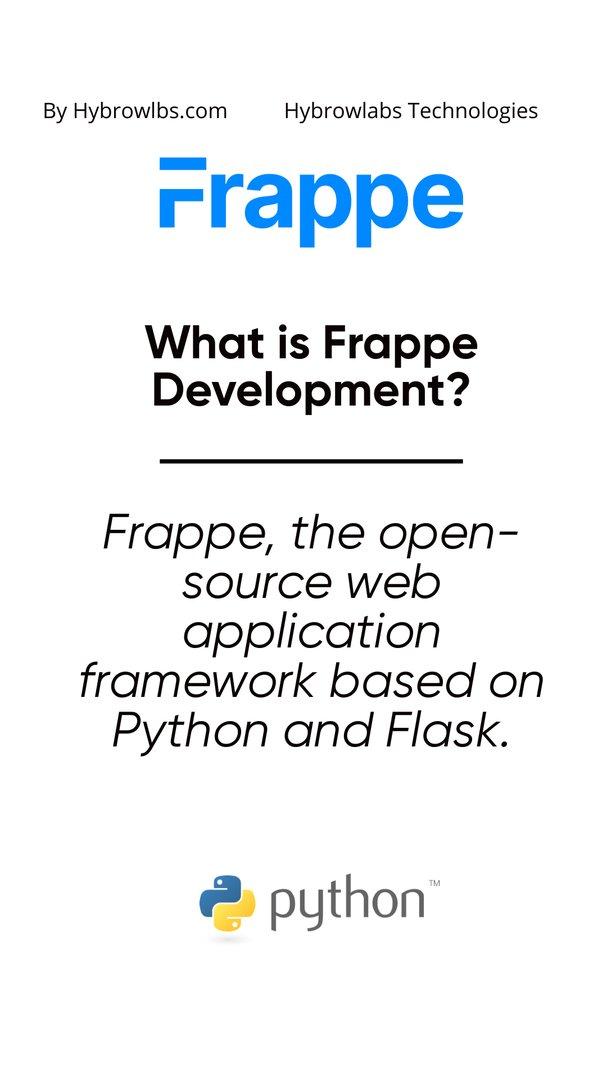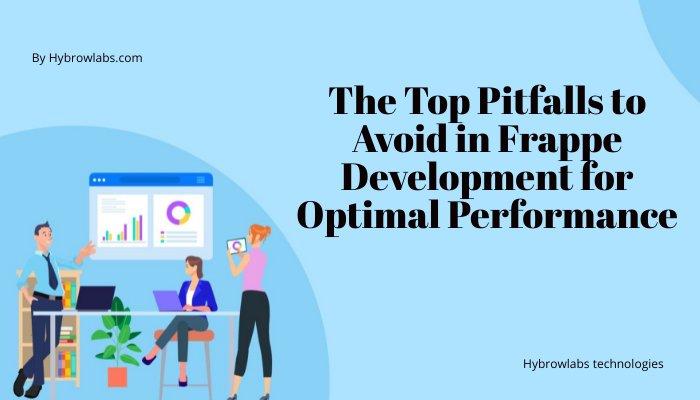 What is Frappe Development?
What is Frappe Development?
Frappe, a open-source web application framework, has gained popularity in creating customized enterprise applications. Developed with Python programming language and based on Flask web framework, Frappe boasts of its simplicity yet robustness in constructing intricate web apps quickly and effortlessly. A wide array of ready-to-use modules and functionalities, such as user validation, content, and workflow management, are also included in Frappe's features set.
How Can Performance Optimization Elevate Your Frappe Development?
Optimizing performance is a vital aspect of Frappe development for various reasons. Among these, enhancing the user experience ranks high.
- A Frappe application with optimized performance offers a fast and responsive user interface, particularly important for web applications. Slow loading times and unresponsive interfaces lead to frustration for users and result in lost business.
- Increasing efficiency is another essential reason for performance optimization in Frappe development. By optimizing performance, server load is reduced, improving the overall efficiency of the application. This, in turn, reduces hosting costs, improves scalability, and enables the application to handle a more significant number of users and requests.
- Better search engine ranking is yet another significant benefit of performance optimization. Search engines such as Google prioritize fast-loading websites in their search results. Therefore, optimizing the performance of a Frappe application can improve its website ranking on search engine result pages (SERPs), thereby driving more traffic to the site.
- Performance optimization also leads to better conversion rates. A fast and efficient Frappe application provides a seamless user experience that increases the chances of users converting, such as making purchases or filling out forms.
- In today's digital era, businesses providing a fast and responsive user experience gain a competitive advantage. Optimizing Frappe application performance helps differentiate businesses from their competitors, earning a reputation as providers of high-quality, efficient web applications.
In conclusion, performance optimization is a critical aspect of Frappe development that provides several benefits such as better user experience, improved efficiency, boosted search engine ranking, increased conversion rates, and competitive advantage.
 How to Measure and Improve Your System's Efficiency?
How to Measure and Improve Your System's Efficiency?
Performance metrics are important in Frappe development as they provide insights into how well your application is performing. Here are some common performance metrics and their meanings:
- CPU Usage
- Memory Usage
- Network Usage
- Database Operations
By monitoring these performance metrics, you can identify areas of your Frappe application that may be causing performance issues and take steps to optimize your application.
Falling into the Frappe Trap: Common Pitfalls in Frappe Development:
Following best practices, performance optimization, effective application security, insufficient testing, and improper code documentation are some major mistakes in the creation of Frappe. This can result in subpar application performance, security flaws, and troublesome application maintenance over time.
1. Inefficient Code:
Frappe development can frequently fall victim to inefficient code, which causes sluggish performance and excessive resource use. This may happen if programmers don't properly optimise their code, do too many database queries, or don't make use of cache methods. Performance issues can also be caused by employing nested loops or big data sets without sufficient indexing. Developers should periodically evaluate their code for areas that may be optimised, use caching tools, and put best practises for database queries and data indexing in place to prevent this pitfalls. They can increase the overall effectiveness and performance of their Frappe applications by doing this.
2. Inadequate Database Indexing:
Another frequent mistake in Frappe development that can result in sluggish performance and lower efficiency is inadequate data indexing. When data is not correctly indexed by developers, delayed database queries and search results can ensue. In other circumstances, developers could also make an excessive number of indexes, which might also have a negative impact on performance. Developers should thoroughly examine their data to identify the fields that are most commonly searched for or queried, and then design indexes based on those findings. To maintain optimal performance, they should also refrain from building pointless indexes and constantly examine their indexing technique. They can increase the overall effectiveness and usability of their Frappe applications by doing this.
3. Poor Caching:
In Frappe development, poor caching is a typical pitfall that can lead to reduced efficiency and sluggish performance. This issue arises when developers neglect to employ caching mechanisms, which result in repeated database queries and slow response times. Additionally, unsuitable caching strategies, such as caching frequently changing data, can also cause stale data and incorrect outcomes. To avoid this pitfall, developers must implement appropriate caching mechanisms for their application. They must cache data that is frequently accessed or create a caching layer for database queries. They must also diligently manage their caching strategy, ensuring that cached data remains current and precise. By doing so, developers can enhance the overall performance and efficiency of their Frappe applications.
4. Neglecting the Use of Queues:
It's quite common for Frappe developers to make the mistake of not using queues, which can result in sluggish performance and inefficient task processing. This problem arises when developers don't employ queueing mechanisms, and tasks end up being processed synchronously, causing resource bottlenecks. Moreover, developers may also overlook the proper configuration and management of their queues, leading to delays or task failures. To steer clear of this pitfall, developers must implement suitable queueing mechanisms, such as Celery or Redis, and ensure that their queues are correctly configured and managed. In this way, they can boost the efficiency and scalability of their Frappe applications.
5. Ignoring Security Measures:
A common mistake made by Frappe developers is to overlook security measures, which can lead to potential data breaches and security vulnerabilities. This issue arises when developers fail to implement proper security protocols, such as weak authentication mechanisms or inadequate input sanitization. In addition, developers may also forget to routinely update and patch their application, leaving it susceptible to known security threats. To evade this trap, developers must incorporate appropriate security measures into their application, such as robust authentication mechanisms, effective input sanitization techniques, and regular application updates and patches. By doing so, they can enhance the overall security and reliability of their Frappe applications.
6. Lack of Testing:
Lack of adequate testing is a pervasive and ubiquitous pitfall in the development of Frappe applications, which has the potential to trigger several bugs and errors within the application. This issue arises when developers disregard the implementation of appropriate testing mechanisms, such as unit or integration testing. Moreover, developers may overlook conducting comprehensive and meticulous tests on their applications before deployment, thereby giving rise to potential issues that may result in downtime. To steer clear of this quandary, developers must introduce appropriate testing mechanisms for their application and conduct rigorous testing before deploying it. By doing so, they can enhance the general quality and dependability of their Frappe applications.
7. Overuse of Custom Scripts:
Developers often fall into the trap of overusing custom scripts in Frappe development, leading to a surge in complexity and a decline in maintainability of the application. This predicament arises when developers rely excessively on custom scripts to introduce functionality, instead of utilizing the existing Frappe features and frameworks at their disposal. Furthermore, custom scripts are arduous to maintain and debug, paving the way for potential issues and downtime. To circumvent this hazard, developers must use custom scripts judiciously and capitalize on the existing Frappe features and frameworks as much as possible. By doing so, they can enhance the overall maintainability and scalability of their Frappe applications.
 Maximizing Frappe's Potential: What Are the Best Practices for Achieving Optimal Performance in Frappe Development?
Maximizing Frappe's Potential: What Are the Best Practices for Achieving Optimal Performance in Frappe Development?
1. Code Optimization:
Code optimization is a key practice in Frappe development that involves writing efficient and well-structured code to improve application performance. Best practices for code optimization in Frappe development include minimizing the use of nested loops, reducing the number of database queries, and properly indexing data for faster retrieval. Developers should also use efficient algorithms and data structures, and avoid using excessive memory or CPU resources.
2. Database Optimization:
Data optimization is an important practice in Frappe development that involves optimizing the database structure and performance. Best practices for data optimization in Frappe development include properly indexing data for faster retrieval, using appropriate normalization techniques, and avoiding unnecessary database queries. Developers should also regularly monitor and optimize their database performance by analyzing slow queries and implementing proper query caching.
3. Caching Optimization:
Caching optimization is a key practice in Frappe development that involves using appropriate caching mechanisms to store frequently accessed data. Best practices for caching optimization in Frappe development include using caching mechanisms such as Redis or Memcached, and ensuring that their caching strategies are properly configured and updated to prevent stale data. Developers should also ensure that their caching strategies do not consume excessive resources and that they are used in conjunction with proper database indexing.
4. Queue Optimization:
Queue optimization is a practice in Frappe development that involves using appropriate queueing mechanisms, such as Celery, and properly configuring and managing queues to improve application performance. Best practices for queue optimization in Frappe development include processing tasks asynchronously to prevent tying up resources and slowing down the application, ensuring that queues are properly configured and managed, and using appropriate queue monitoring tools to analyze queue performance.
5. Security Optimization:
Security optimization is a critical practice in Frappe development that involves implementing appropriate security measures to protect sensitive data and prevent unauthorized access. Best practices for security optimization in Frappe development include using strong authentication mechanisms, properly sanitizing user inputs, regularly updating and patching the application to prevent known security threats, and implementing appropriate access controls. Developers should also use encryption to protect sensitive data and follow industry-standard security practices to minimize the risk of security breaches.
6. Testing Optimization:
Testing optimization is an important practice in Frappe development that involves implementing proper testing procedures to identify and address performance issues before deployment. Best practices for testing optimization in Frappe development include creating and implementing automated testing scripts to identify and fix performance bottlenecks, using load testing tools to simulate high traffic scenarios, and performing regular regression testing to ensure that new features do not negatively impact performance.
 Conclusion:
Conclusion:
In conclusion, the optimization of performance plays a crucial role in the triumph of Frappe development ventures. By enhancing the speed and scalability of the application, developers can furnish a superior user experience and mitigate the possibility of downtimes or system crashes. Nonetheless, there exist numerous commonplace traps that developers ought to circumvent, including suboptimal coding techniques, deficient data indexing, inadequate caching, and disregard for the management of queues and security protocols.
To attain the pinnacle of performance, developers must adhere to the recommended guidelines, comprising optimization of coding techniques, optimization of database management, optimization of caching techniques, optimization of queue administration, optimization of security protocols, and optimization of testing procedures. Through the adoption of these techniques, developers can fabricate high-grade, proficient, and dependable Frappe applications. Utilizing services like Hybrowlabs Development services can further support these efforts and help create tailored solutions for optimized performance in Frappe applications.
FAQ’s
1. How does inefficient code affect Frappe apps' performance, and how can it be avoided?
Frappe programs might become unstable or crash as a result of inefficient programming. Developers should concentrate on developing effective and optimized code, eliminating pointless computations and database queries, and using libraries and frameworks that are built for maximum efficiency to prevent this.
2. Which best practices should be followed to prevent data indexing problems that can cause Frappe applications to sluggish?
The use of appropriate indexing methods, avoiding too complicated queries, and making sure that data structures are correctly normalized and optimized for efficient querying are all best practices for preventing data indexing concerns.
3. How does poor caching affect the performance of Frappe applications, and what are some effective caching strategies to mitigate this issue?
Poor caching can lead to slow application performance and increased server load. Effective caching strategies include using browser caching, server-side caching, and content delivery networks (CDNs) to reduce server requests and improve load times.
4. What are some common mistakes developers make when working with queues in Frappe development, and how can they be avoided?
Common mistakes include neglecting to use queues, using poorly designed queue systems, and failing to properly monitor and manage queue performance. To avoid these issues, developers should prioritize queue implementation and use established queue frameworks, and regularly monitor queue performance.
5. How can collaboration and communication between developers and other stakeholders help to identify and address performance issues in Frappe development, and what are some effective strategies for facilitating this process?
Collaboration and communication between developers and stakeholders can help to identify and address performance issues by promoting transparency and ensuring that all parties are aware of project goals and objectives. Effective strategies for facilitating this process include regular project status updates, ongoing communication between developers and stakeholders, and regular performance reviews to identify and address performance issues.






a3dc85.jpg)

.jpg)
fd8f11.png)


.jpg)
.jpg)